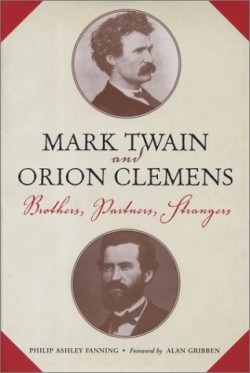Mark Twain and Orion Clemens
Brothers, Partners, Strangers
This book will have Twain scholars and fans vigorously discussing its merits for years to come. The author takes as his subject the relationship between Mark Twain and his older brother, Orion, traditionally presented as a bit of a buffoon by biographers. According to Fanning, “This was no accident; in his Autobiography and elsewhere the great humorist did his best to make sure that if posterity took note of Orion at all it would be as a ludicrous figure.”
Twain’s animosity toward his older brother dates, according to Fanning, from the period after their father’s death, when young Samuel was eleven. Ten years older than Sam, Orion was forced to assume leadership of the family. Fanning, an independent researcher, crafts a narrative of classic sibling rivalry: the young Sam Clemens chafed under his older brother’s rules, especially when they worked in the same newspaper office. In particular, Fanning points to one incident where Sam wanted to buy a gun and Orion forbade him. This confrontation nearly led to tragic consequences. In the most controversial claim in this book, Fanning argues that after Sam left home as a young man to make his own way in the world, he returned to his family home with a newly purchased gun and the intent to murder his older brother. Good reason prevailed, and the plan was abandoned; however, Orion and the rest of the family were never aware of how close Sam Clemens came to being a murderer rather than a beloved author.
This is the claim that will surely be hotly contested among Fanning’s readers. That there was tension between the brothers at various points in their life is clear. But was the relationship so bad as to nearly drive Twain to fratricide? Unfortunately, the evidence Fanning offers is circumstantial and speculative. It is based upon a comment in a letter written years afterwards where Twain claimed “I bought a revolver once and traveled twelve hundred miles to kill a man.” Fanning takes the statement as true and pieces together a narrative in which the intended victim had to be Orion.
Fanning’s inclination toward speculation is the book’s greatest flaw. Too often, arguments are built upon phrases such as “Almost certainly the brothers clashed” and “There may have been a heated exchange…”
It is almost unfortunate that Fanning includes the section on the aborted fratricide. Undoubtedly, that is the aspect of the book that will garner the most attention, and readers are likely to overlook the best parts of the book; Fanning does an excellent job of fleshing out the sometimes antagonistic but always deeply caring relationship of the brothers, and he convincingly shows that as a young man Orion was not the buffoon that Twain made him out to be.
Reviewed by
Erik Bledsoe
Disclosure: This article is not an endorsement, but a review. The publisher of this book provided free copies of the book to have their book reviewed by a professional reviewer. No fee was paid by the publisher for this review. Foreword Reviews only recommends books that we love. Foreword Magazine, Inc. is disclosing this in accordance with the Federal Trade Commission’s 16 CFR, Part 255.

